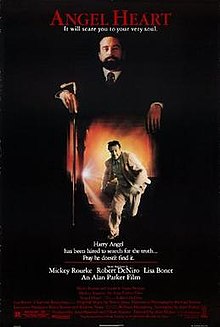
Back أينجل هارت Arabic اينجل هارت ARZ Ангелско сърце Bulgarian El cor de l'àngel Catalan Angel Heart Czech Angel Heart Welsh Angel Heart German Δαιμονισμένος άγγελος Greek Angel Heart - Ascensore per l'inferno EML Angel Heart (película) Spanish
| Angel Heart | |
|---|---|
 Theatrical release poster | |
| Directed by | Alan Parker |
| Screenplay by | Alan Parker |
| Based on | Falling Angel by William Hjortsberg |
| Produced by | |
| Starring | |
| Cinematography | Michael Seresin |
| Edited by | Gerry Hambling |
| Music by | Trevor Jones |
Production company | |
| Distributed by | Tri-Star Pictures |
Release date |
|
Running time | 113 minutes |
| Country | United States |
| Language | English |
| Budget | $18 million[1][2] |
| Box office | $17.2 million (domestic) |
Angel Heart is a 1987 American neo-noir psychological horror film, an adaptation of William Hjortsberg's 1978 novel Falling Angel. The film was written and directed by Alan Parker, and stars Mickey Rourke, Robert De Niro, Lisa Bonet, and Charlotte Rampling. Harry Angel (Rourke), a New York City private investigator, is hired to solve the disappearance of a man known as Johnny Favorite. His investigation takes him to New Orleans, where he becomes embroiled in a series of brutal murders.
Following publication of the novel, Hjortsberg began developing the screenplay for a film adaptation, but found that no major studio was willing to produce his script. The project resurfaced in 1985, when producer Elliott Kastner brought the book to Parker's attention. Parker began work on a new script and in doing so made several changes from Hjortsberg's novel. He also met with Mario Kassar and Andrew G. Vajna, who agreed to finance the $18 million production through their independent film studio Carolco Pictures. Filming took place on location in New York City and New Orleans, with principal photography lasting from March 1986 to June of that year.
Weeks before its theatrical release, Angel Heart faced censorship issues from the Motion Picture Association of America for one scene of sexual content. Parker was forced to remove ten seconds of footage to avoid an X rating and secure the R rating that the film's distributor Tri-Star Pictures wanted. An unrated version featuring the removed footage was later released on home video.
Angel Heart received a mixed reaction from reviewers, who praised the performances of Rourke and Bonet, as well as the production design, score, and cinematography, but criticized Parker's screenwriting. The film underperformed at the North American box office, grossing $17.2 million during its theatrical run, but has since been regarded as underappreciated and influential.